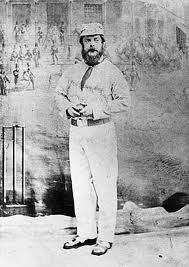
A gradual but inevitable descent into cricket-based loathing and bile.
No Such Thing As A Free Launch: Robert Winder’s ‘The Little Wonder’
Every day is an anniversary these days. The centenary of this. Forty years since that. Last year famously saw the publication of the 150th edition of Wisden Cricketers’ Almanack, to much triumphing in the press. In honour of that achievement – it’s the longest-running sports publication in the world, apparently – Robert Winder has written “the remarkable history of Wisden.”
At more than 400 pages – excluding the index – it’s an exhaustive book, one that must reflect an impressive amount of research. It’s basically chronological, starting with the mid Nineteenth Century context in which John Wisden opened a cricket and cigar shop and ending with Lawrence Booth’s latest edition. At times the book becomes mundane – there are only so many business deals that can be described before one’s eyes start watering with boredom – which is probably a symptom of any book about a book.
But the often turbulent times of Wisden’s history do present interesting sections. The tales from the two World Wars are particularly illuminating and the fortunes of the book seem to reflect the changing socio-economic context of cricket itself. It is a history that is interesting (perhaps not “remarkable”), but one suspects that only a Wisden-obsessive would appreciate the detail that Winder goes in to. The history could be condensed considerably and it would be an easier read. If 400 pages really are required, then extracts from the book’s hallowed pages would have been a worthwhile addition. The reader is left appreciative of the “bible of cricket” (though most cricket fans would be already) and it is remarkable that a book 150 years old is still the principal published source of cricketing information, writing and statistics. Winder does well to describe how recent editors have faced the challenge of the internet, and optimistically believes that whatever happens to cricket – and to how people consume information – in the future, Wisden will endure.
Arguably the best thing about this book though is that it inspires the reader to retrieve old copies from the shelf and flick through their pages once more. Which would probably be a much better way of spending your hours than reading every line of Winder’s book.



No Comments
Post a Comment